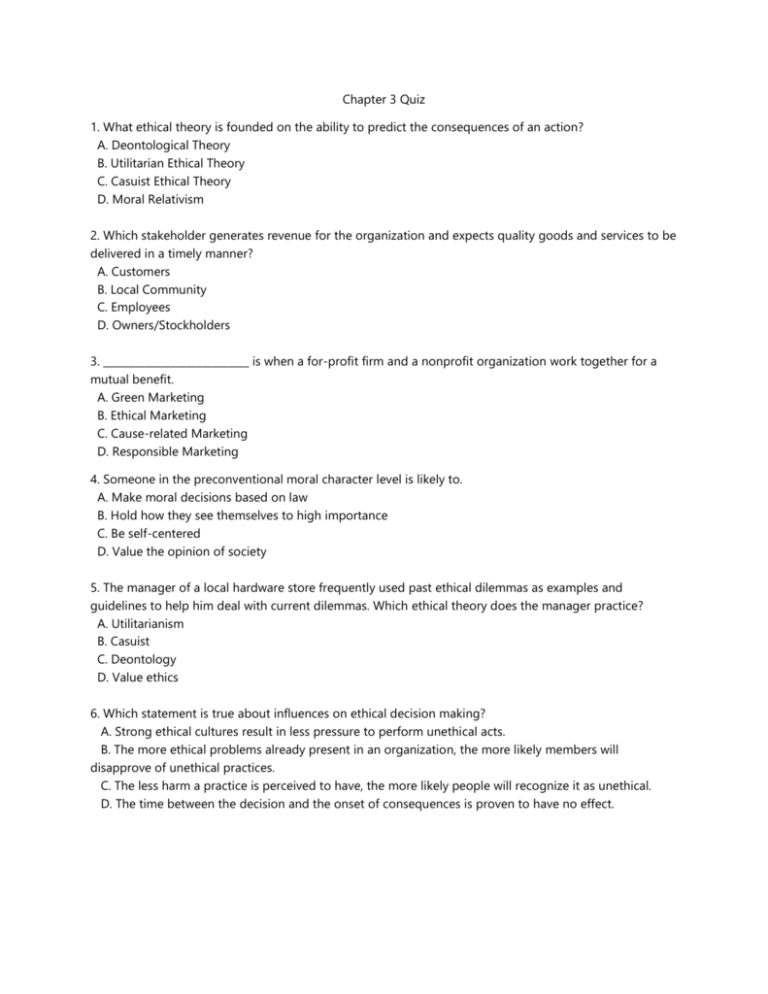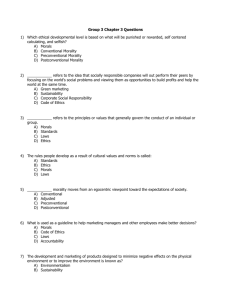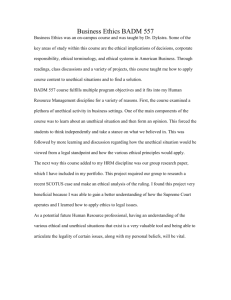Quiz 3
advertisement

Chapter 3 Quiz 1. What ethical theory is founded on the ability to predict the consequences of an action? A. Deontological Theory B. Utilitarian Ethical Theory C. Casuist Ethical Theory D. Moral Relativism 2. Which stakeholder generates revenue for the organization and expects quality goods and services to be delivered in a timely manner? A. Customers B. Local Community C. Employees D. Owners/Stockholders 3. ____________________________ is when a for-profit firm and a nonprofit organization work together for a mutual benefit. A. Green Marketing B. Ethical Marketing C. Cause-related Marketing D. Responsible Marketing 4. Someone in the preconventional moral character level is likely to. A. Make moral decisions based on law B. Hold how they see themselves to high importance C. Be self-centered D. Value the opinion of society 5. The manager of a local hardware store frequently used past ethical dilemmas as examples and guidelines to help him deal with current dilemmas. Which ethical theory does the manager practice? A. Utilitarianism B. Casuist C. Deontology D. Value ethics 6. Which statement is true about influences on ethical decision making? A. Strong ethical cultures result in less pressure to perform unethical acts. B. The more ethical problems already present in an organization, the more likely members will disapprove of unethical practices. C. The less harm a practice is perceived to have, the more likely people will recognize it as unethical. D. The time between the decision and the onset of consequences is proven to have no effect. 7. Which list correctly represents the modes of control? A. Ethics, Laws, Morals, Formal and Informal Groups, Self Regulation, Active Civil Society B. Ethics, Laws, Morals, Self Regulation, Active Civil Society C. Ethics, Laws, Morals, Self Regulation, Media, Active Civil Society D. Ethics, Laws, Formal and Informal Groups, Self Regulation, Media, Active Civil Society 8. A person who follows this theory will produce very consistent decisions because they will be based on the individual’s set duties. A. Deontological theory B. Utilitarian ethical theory C. Casuist ethical theory D. Moral Relativism 9. In what level of ethical development are people less concerned about how others might see them and more concerned about how they see and judge themselves over the long run? A. Preconventional morality B. Conventional morality C. Postconventional morality D. Postmodernconventional morality 10. What is the foundation of the pyramid of corporate social responsibility? A. Legal responsibilities B. Economic responsibilities C. Ethical responsibilities D. Philanthropic responsibilities Answers: 1. 2. 3. 4. 5. 6. 7. 8. 9. 10. B A C C B A D A C B








